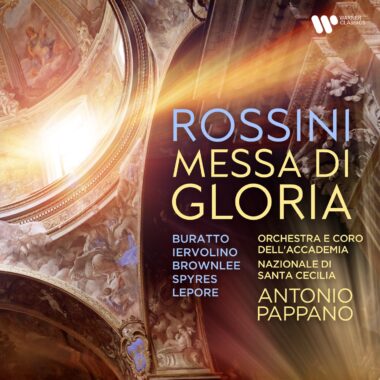More details
Gioachino Rossini (1792-1868): Messa di gloria. Eleonora Buratto, soprano; Teresa Iervolino, mezzo-soprano; Lawence Brownlee, tenor; Michael Spyres, tenor; Carlo Lepore, bass; Orchestra e coro dell’Accademia nazionale di Santa Cecilia, conductor: Antonio Pappano. 1 CD Warner Classics. Recorded from January 27 to 29, 2022 at the Auditorium Parco della musica in Rome. Presentation text in English, French and German. Duration: 61:10
Warner Classics
Benefiting from a splendid cast of soloists, this atypical religious work should satisfy lovers of bel canto as well as listeners keen on sacred music. A fine act of faith on the part of a composer still clearly turned towards the theatre.
Much less known than Stabat mater and the Small Solemn Massthe Messa di gloria by Rossini is an intriguing and disconcerting work. Rich in dissonances and almost avant-garde chromaticisms that are sure to surprise the listener, it is by far of all Rossini’s religious compositions the one that owes the most to the bel canto tradition. Many of his arias would not be out of place in a scenic work from the first decades of the 19th century, and we can recognize here and there a formula heard in a past or future opera. Don’t be offended, we know that self-plagiarism was commonplace at the time. Does this mean that the Messa di gloria lack of spirituality? One might think so, as the musical gesture is so theatrical and the vocal writing virtuoso. But isn’t it precisely the characteristic of this still post-baroque musical aesthetic to encourage the way to God by the richness of the ornament and the voluptuousness of the line? Lovers of swirls and vocalizations, in any case, will be delighted. Written for Naples in 1820, in circumstances of which in reality little is known, the work is what will be called a product of its time, disconcerting as it may seem to our present ears.
The recording made in Rome by Antonio Pappano at the head of the forces of the Sainte-Cécile Academy should satisfy both lovers of religious music and virtuoso singing. The very theatrical direction of the conductor accentuates the excesses of Baroque religiosity inherent in the work, and thus contrasts with the somewhat static hieraticism imposed on Rossini’s score in the past by Neville Marriner and The Academy of St Martin-in-the-Fields, in one of the rare discographic versions of the work to have held the poster in its time. The choir is nonetheless invested, and the instrumental soloists (clarinet, English horn) of the Academy of Sainte-Cécile are even more virtuoso than their English counterparts. If Marriner’s recording benefited from an exceptional vocal quartet – Sumi Jo, Ann Murray, Raul Gimenez, Francisco Araiza and Samuel Ramey – the soloists of the new version all manage to do well, and their attendance regularity of Rossinian works of the period seems obvious at all times. Eleonora Burattoa renowned belcantist, thus has a more lyrical instrument than Sumi Jo, which she knows how to adorn with beautiful melancholic colors thanks in particular to a slightly veiled timbre. Teresa Iervolino She also has a beautiful vocal paste, which she knows how to lighten at will in the purest Rossinian style. Only Carlo Lepore disappoints somewhat, his instrument a bit cavernous failing to restore, despite real facilities in the vocalization, the haughty nobility that was once that of the voice of the masterful Samuel Ramey. In both tenor parts, the breathtaking Lawrence Brownlee and Michael Spyres celebrate their reunion, a few months after their breathtaking CD devoted to Rossini opera ensembles. If only for this vocal feast, we can only highly recommend the (re)discovery of a work that will not fail to astonish the listener.
(Visited 1 times, 3 visits today)
More details
Gioachino Rossini (1792-1868): Messa di gloria. Eleonora Buratto, soprano; Teresa Iervolino, mezzo-soprano; Lawence Brownlee, tenor; Michael Spyres, tenor; Carlo Lepore, bass; Orchestra e coro dell’Accademia nazionale di Santa Cecilia, conductor: Antonio Pappano. 1 CD Warner Classics. Recorded from January 27 to 29, 2022 at the Auditorium Parco della musica in Rome. Presentation text in English, French and German. Duration: 61:10
Warner Classics
Tags for this article

